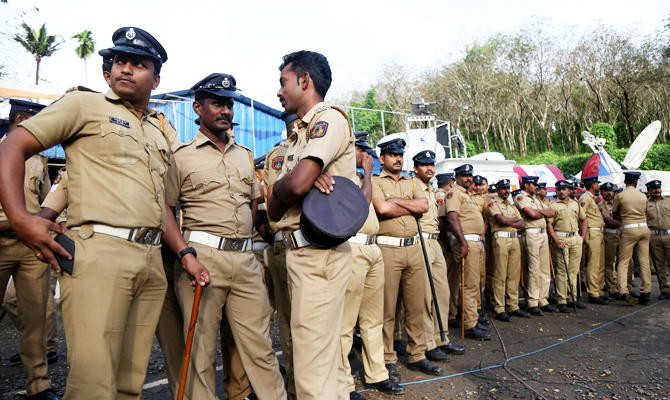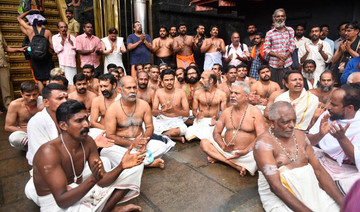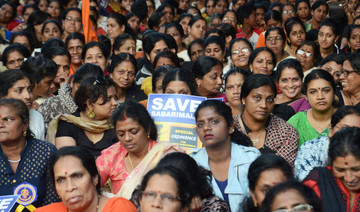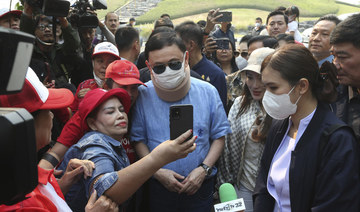NEW DELHI: Indian police have rounded up more than 2,000 people for stopping women from entering a flashpoint Hindu shrine in defiance of a Supreme Court order, officials said Friday.
Hindu hard-liners prevented women aged 10 to 50 from reaching the Sabarimala temple complex in Kerala state over the last week — the first time the temple has opened since the court ended a longstanding ban on women of menstruating age from worshipping there.
Protesters, including women and children, massed at the bottom of a hill leading to the shrine, threatening and manhandling any women who attempted to reach the temple.
Some protesters smashed car windows and clashed with olice, who started a crackdown on the blockade Wednesday.
“We have arrested 2,061 people under various sections of the Indian penal code, including inciting communal violence, the arms act and destruction of public property,” a police official told AFP on condition of anonymity.
The official added that 452 cases had been registered against the suspects so far.
More arrests appeared likely as details of hundreds more suspects were to be published, police said.
The temple has become the center of a gender equality battle, pitting traditionalists against progressive voices pushing for a more liberal Hinduism.
The shrine is only open on a handful of days every year, and after last month’s Supreme Court order a number of Hindu women had flocked there.
Armed police tried to escort some devotees — but none made it to the top of the hill where the temple is located during the five-day worship period before it closed late Monday.
The temple will open for a one-day ritual next week and starts a two-month festival in the second week of November.
The Supreme Court is also to hear new petitions challenging its ruling in favor of women in November.
Sabarimala devotees believe allowing women of menstruating age to worship goes against the wishes of Lord Ayappa, a celibate deity.
Kerala’s influential Nair community have slammed police for arresting “devotees,” calling the action unethical and undemocratic.
Most Hindu temples allow women to enter as long as they are not menstruating.
Two years ago, activists campaigned to end a ban on women entering the Shani Shingnapur temple in Maharashtra state.
Women were also permitted to enter Mumbai’s Hajji Ali Dargah mausoleum, a Muslim place of worship, after the Supreme Court ended a ban in 2016.
India police arrest more than 2,000 over temple protests
India police arrest more than 2,000 over temple protests

- “We have arrested 2,061 people under various sections of the Indian penal code, including inciting communal violence, the arms act and destruction of public property,” a police official told AFP on condition of anonymity
Singapore Airlines flight investigation finds sharp altitude drop caused injuries

- One passenger died of a suspected heart attack and dozens were injured after Flight SQ321 encountered extreme turbulence
One passenger died of a suspected heart attack and dozens were injured after Singapore Airline Flight SQ321, flying from London to Singapore, encountered what the airline described as sudden, extreme turbulence while flying over Myanmar. The ministry said the investigation was ongoing.
The SQ321 London-Singapore flight on a Boeing 777-300ER plane carrying 211 passengers and 18 crew diverted to Bangkok for an emergency landing after the plane was buffeted by turbulence that flung passengers and crew around the cabin, slamming some into the ceiling.
“The aircraft experienced a rapid change in G (gravitational force) ... This likely resulted in the occupants who were not belted up to become airborne,” the ministry said in a statement, citing a report by the Transport Safety Investigation Bureau of Singapore.
“The vertical acceleration changed from negative 1.5G to positive 1.5G within 4 seconds. This likely resulted in the occupants who were airborne to fall back down.
“The rapid changes in G over the 4.6 seconds duration resulted in an altitude drop of 178 ft (54 m), from 37,362 ft to 37,184 ft. This sequence of events likely caused the injuries to the crew and passengers,” it said.
The report also said a pilot was heard calling out that the fasten seat belt sign had been switched on.
Aid reaches Papua New Guinea landslide site

- Difficulties getting aid and supplies to the site has stoked a mix of desperation and frustration on the ground
- Full-scale rescue and relief efforts have been severely hampered by the site’s remote location
PORT MORESBY: Supplies of food and medicine began arriving at the scene of a deadly landslide in Papua New Guinea Wednesday, with aid workers discovering children rendered mute by the shock of the disaster.
Papua New Guinea’s government estimates that as many as 2,000 people may be buried underneath a massive landslide that struck a thriving highland settlement in Enga province in the early hours of May 24.
Only six bodies have so far been pulled from the mountain of churned-up earth after days of frantic digging with makeshift tools.
Difficulties getting aid and supplies to the site — and the speed of the government response — has stoked a mix of desperation and frustration on the ground.
Community leader Miok Michael said that 19 of his “family members and relatives” were missing and feared dead.
“The relief support and donations are slowly reaching the affected site,” said Michael, who recently visited the disaster zone.
“But displaced people are still crying and calling for help. There is no proper house for them to sleep, all their houses were buried.”
With rescue teams abandoning hope of finding survivors under the meters of mud and rubble, the community has started to count the emotional and physical cost.
Mourning locals have started carrying the dead away in immense “haus krai” funeral processions, collective outpourings of love and grief that can last for weeks.
Images showed a group of men carrying a wooden casket down the forested valley on their shoulders as scores of mourners trailed behind them, wailing with despair.
Aid groups fear children will bear the brunt of the catastrophe, estimating that 40 percent of residents in the area are younger than 16.
“What we are hearing is that, because of what they saw and experienced, many of the children have stopped talking,” Justine McMahon from CARE Papua New Guinea said.
Niels Kraaier from UNICEF Papua New Guinea said workers were aware of nine orphaned children.
UNICEF said it had started distributing rudimentary hygiene kits of buckets, jerrycans and soap, while World Vision said food, shelter, blankets and mosquito nets remained immediate needs.
However, full-scale rescue and relief efforts have been severely hampered by the site’s remote location, nearby tribal violence and landslide damage that has severed major road links.
The collapse of bridges along the sealed road to the site has forced lengthy detours for some aid convoys.
Papua New Guinea’s military tried for days to bring heavy earth-moving equipment to the site.
But, with a series of bridges in a state of disrepair or damaged by earlier floods, they have now abandoned that plan and will source equipment from mines and businesses.
That equipment will arrive at the landslide by Thursday at the “latest,” UN migration agency official Serhan Aktoprak said.
Provincial leaders have implored the government to declare a national emergency that would draw attention to their plight and free up resources.
“I am not equipped to deal with this tragedy,” provincial administrator Sandis Tsaka said.
Prime Minister James Marape is yet to visit the remote pocket of Enga province more than five days after the landslide.
He has stayed in the capital Port Moresby, where his government is trying to fend off a no-confidence motion that could sweep it from power.
There are concerns this political manoeuvering has drawn attention away from what could be one of the country’s worst natural disasters.
Marape told parliament on Wednesday that the village of Yambali was “no more.”
“Nature, through a disastrous landslip, submerged or covered the village and from our initial estimation over 2,000 people would have perished in this disaster.”
“In this year, we have had extraordinary rainfall that has caused flooding in river areas, sea level rise in coastal areas, and landslips in a few areas,” Marape said.
Papua New Guinea is one of the world’s most disaster-prone regions and landslides are extremely common in its highlands.
Geologists believe recent heavy rain may have contributed to the slide.
“Papua New Guinea sits right on a plate boundary, where these large, rigid parts of the earth plow into each other,” University of Adelaide geologist Alan Collins said.
“This creates mountains, steep slopes and other extreme topography.
“You have these steep slopes located in an area of heavy rainfall, and this can rot the minerals in the rocks, and gradually weaken them.”
The World Bank and others have warned that landslides were likely to increase in Papua New Guinea due to a growing population and uncontrolled land use.
Scientists have also warned that climate change will cause more extreme rainfall across most parts of the world.
China hosts Arab leaders at forum aimed at deepening ties

- Beijing has sought to build closer ties with Arab states in recent years
- Last year it brokered a detente between Iran and Saudi Arabia
BEIJING: China on Wednesday hosts a litany of Arab dignitaries and diplomats ahead of a forum Beijing hopes will deepen ties with the region and present a “common voice” on the conflict between Israel and Hamas.
Beijing has sought to build closer ties with Arab states in recent years, and last year brokered a detente between Tehran and its long-time foe Saudi Arabia.
It has also historically been sympathetic to the Palestinian cause and supportive of a two-state solution to the Israeli-Palestinian conflict.
And Beijing last month hosted rival Palestinian groups Hamas and Fatah for “in-depth and candid talks on promoting intra-Palestinian reconciliation.”
Egypt’s President Abdel Fattah El-Sisi and UAE President Sheikh Mohamed bin Zayed Al-Nahyan, as well as a host of other regional leaders and diplomats, are among the delegates attending the forum.
President Xi Jinping is set to deliver a keynote speech at the opening ceremony on Thursday, Beijing has said, aimed at building “common consensus” between China and Arab states.
Top of the agenda will be the war between Israel and Hamas, which Xi has called for an “international peace conference” to resolve.
China sees a “strategic opportunity to boost its reputation and standing in the Arab world” by framing its efforts to end that conflict against US inaction, Ahmed Aboudouh, an associate fellow with the Chatham House Middle East and North Africa Programme, said.
“This, in turn, serves Beijing’s focus on undermining the US’s credibility and influence in the region,” he said.
“The longer the war, the easier for China to pursue this objective,” he added.
On Tuesday, Foreign Minister Wang Yi met with counterparts from Yemen and Sudan in Beijing, saying he hoped to “strengthen solidarity and coordination” with the Arab world.
He also raised China’s concerns over disruptive attacks on Red Sea shipping by Iran-backed Houthi forces acting in solidarity with Hamas with his Yemeni counterpart Shayea Mohsen Al-Zindani.
“China calls for an end to the harassment of civilian vessels and to ensure the safety of waterways in the Red Sea,” state news agency Xinhua quoted him as saying.
Former Thai Prime Minister Thaksin Shinawatra to face trial for royal insult

- The former prime minister will also be indicted for violating the Computer Crime Act
- Thaksin had been in self-imposed exile since 2008, but returned to Thailand in August last year
BANGKOK: Thai prosecutors said Wednesday former Prime Minister Thaksin Shinawatra will be indicted for defaming the monarchy, three months after he was freed on parole on other charges.
Thaksin will not yet be indicted because he had filed a request to postpone his original appointment on Wednesday with proof that he has COVID-19, Prayuth Bejraguna, a spokesperson for the Office of the Attorney General, said at a news conference.
The attorney general’s office scheduled a new appointment for Thaksin’s indictment on June 18, Prayuth said, adding that Thaksin will also be indicted for violating the Computer Crime Act.
Thaksin had been in self-imposed exile since 2008, but returned to Thailand in August last year to begin serving an eight-year sentence. He was released on parole in February from the hospital in Bangkok where he spent six months serving time for corruption-related offenses.
On his return, he was moved almost immediately from prison to the hospital on grounds of ill health, and about a week after that King Maha Vajiralongkorn reduced his sentence to a single year. Thaksin was granted parole because of his age — he is 74 — and ill health, leaving him free for the remainder of his one-year sentence.
His return was interpreted as part of a political bargain between his Pheu Thai Party and the conservative establishment — longstanding rivals — to stop the progressive Move Forward Party from forming a government following its victory in last year’s general election.
After his return, the attorney general’s office said it had revived an investigation into whether Thaksin almost nine years ago violated the law against defaming the monarch, a crime punishable by up to 15 years in prison.
Thaksin was originally charged in 2016 with violating the law for remarks he made to journalists when he was in Seoul, South Korea, a year before that, but the investigation could proceed only after he was presented with the charge in person in the hospital in January, officials said. Thaksin had denied the charges and submitted a statement defending himself.
Prosecutor’s spokesperson Prayuth said there is enough evidence for the attorney general to indict Thaksin. He said the prosecutors have already prepared their statement and documents to present to the court next month.
Since his release, Thaksin has maintained a high profile and is believed to be wielding influence in the government led by Prime Minister Srettha Thavisin. One analyst believes Thaksin’s growing influence has angered the ultra-conservatives and that the indictment is their response.
“It is designed to keep Thaksin under control. This is keeping him on a leash. If he doesn’t behave then this charge can be activated and could land him in jail. This is to curtail his movement and his maneuvers and to remind him, sending him a signal in a way, to know who’s in charge and to know he should not overstep the boundary,” said Thitinan Pongsudhirak, at professor at Bangkok’s Chulalongkorn University.
South Africans start voting in election that could see ANC lose majority

- Voters are electing nine provincial legislatures and a new national parliament
- More than 27 million people registered to vote out of a population of roughly 62 million
JOHANNESBURG: South Africans started voting on Wednesday in an election that could mark a big political shift if the governing African National Congress party loses its majority as opinion polls suggest.
Voters are electing nine provincial legislatures and a new national parliament, which will then choose the country’s next president.
If the ANC gets less than 50 percent of the national vote it will have to seek one or more coalition partners to govern the country, the first such alliance in the 30 years since it swept to power with Nelson Mandela as its leader at the end of apartheid.
Voting stations opened at 0500 GMT and will close at 1900 GMT, with more than 27 million people registered to vote out of a population of roughly 62 million.
South Africa’s electoral commission is expected to start releasing partial results within hours of voting stations closing. The commission has seven days to announce final results.



















